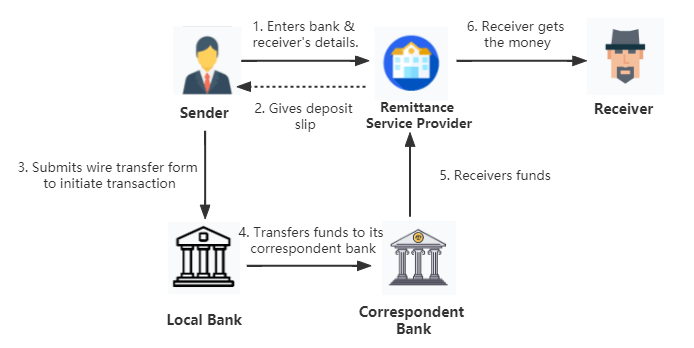In the fast-paced global economy, currency exchange plays a vital role in facilitating international trade and travel. Whether you are a frequent traveller, an online shopper, or a business owner engaged in cross-border transactions, understanding the fundamentals of currency exchange is essential

In today’s interconnected world, the need to transfer money across borders efficiently and securely has become increasingly important. One popular method of international money transfer is through a telegraphic transfer, commonly known as a “telegraphic transfer” or “T/T.”
Currency Exchange:
Currency exchange refers to the process of converting one country’s currency into another based on its prevailing exchange rate. This rate determines the value of one currency concerning another and fluctuates due to various economic factors, geopolitical events, and market sentiments.
The Importance of Currency Exchange
1. Facilitating International Trade
Currency exchange enables smooth international trade by allowing businesses and individuals to buy and sell goods and services in different currencies. It eliminates the need for barter systems and simplifies cross-border transactions.
2. Supporting Travel and Tourism
For travelers, currency exchange is crucial as it permits them to obtain the local currency of the destination country. This convenience ensures they can pay for expenses during their trip, such as accommodation, food, and transportation.
3. Online Shopping and E-commerce
With the rise of online shopping and e-commerce, currency exchange is integral to global transactions. It enables customers to purchase products from international websites and allows businesses to expand their reach to a global audience.
Factors Affecting Currency Exchange Rates
Several factors influence currency exchange rates, and it’s vital to understand them to make informed decisions:
1. Interest Rates
Higher interest rates in a country often lead to a stronger currency value as investors seek better returns on their investments.
2. Economic Performance
A robust economy generally strengthens a country’s currency, while a weak economy may lead to a depreciation of its currency value.
3. Political Stability and Geopolitical Events
Political stability and geopolitical events can significantly impact currency exchange rates. Uncertainty may cause fluctuations in currency values.
4. Market Sentiments
Investor perceptions and market sentiments can influence currency rates in the short term, leading to volatility.
Best Practices for Currency Exchange
1. Research and Compare Rates
Before making any currency exchange, research and compare rates from different sources, such as banks, exchange offices, or online platforms. This practice ensures you get the best possible rate for your transactions.
2. Limit Cash Transactions
While it’s essential to have some cash in hand while travelling, carrying large sums can be risky. Opt for prepaid travel cards or digital payment methods for added security and convenience.
3. Be Cautious of Airport Kiosks
Currency exchange kiosks at airports often offer unfavourable rates due to high overhead costs. It’s best to exchange only a small amount at the airport and find a better rate elsewhere.
4. Consider Timing
Keep an eye on currency trends and consider timing your exchanges strategically to take advantage of favourable rates.
5. Understand Fees and Commissions
Be aware of any fees and commissions involved in currency exchange. Sometimes, seemingly attractive rates may hide additional costs.
How Telegraphic Transfers Work
- Initiating the Transfer: To initiate a telegraphic transfer, the sender needs to visit their bank or use online banking services. They provide the recipient’s banking details, including the bank name, account number, and SWIFT/BIC code.
- Verification and Authorization: The sender’s bank verifies the authenticity of the transaction and ensures that the sender has sufficient funds to cover the transfer amount. Once verified, the bank authorizes the transfer.
- Interbank Communication: The sender’s bank sends a secure message, usually via the SWIFT (Society for Worldwide Interbank Financial Telecommunication) network, to the recipient’s bank, instructing them to credit the recipient’s account with the specified amount.
- Recipient’s Bank Processing: The recipient’s bank receives the message and processes the transfer, crediting the funds to the recipient’s account.
- Notification to the Recipient: Once the transfer is complete, the recipient’s bank notifies the recipient of the incoming funds.
Advantages of Telegraphic Transfers
1. Speed and Efficiency
Telegraphic transfers are one of the fastest ways to send money internationally. Depending on the banks involved and the countries of the sender and recipient, the transfer can be completed within a few hours to a few business days.
2. Security and Reliability
Telegraphic transfers are highly secure, as they involve encrypted messaging between banks. The funds are directly transferred from one account to another, reducing the risk of loss or theft during transit.
3. Global Accessibility
Telegraphic transfers are widely accepted by banks worldwide, making them accessible for individuals and businesses across the globe.
4. No Physical Documentation
Unlike traditional methods like checks or money orders, telegraphic transfers are paperless, reducing the risk of document loss and increasing overall efficiency.
Tips for a Successful Telegraphic Transfer
1. Accurate Information
Ensure that all recipient banking details, including the account number and SWIFT/BIC code, are accurate. Any errors in this information can lead to delays or the transfer being rejected.
2. Be Mindful of Fees
Banks may charge fees for telegraphic transfers, including outgoing and incoming charges. Be aware of these fees to understand the total cost of the transaction.
3. Consider Exchange Rates
Fluctuating exchange rates can impact the final amount received by the recipient. Consider the current exchange rate and any additional charges related to currency conversion.
4. Check Time Zones
Take into account the time zones of both the sending and receiving banks, as well as any holidays that might affect processing times.
Conclusion
Currency exchange is a fundamental aspect of the global economy that impacts businesses and individuals alike. Understanding the basics of currency exchange, its importance, and adopting best practices can lead to more advantageous transactions and cost savings. Whether you’re travelling abroad or engaging in international trade, applying these principles will help you navigate the world of currency exchange with confidence.

